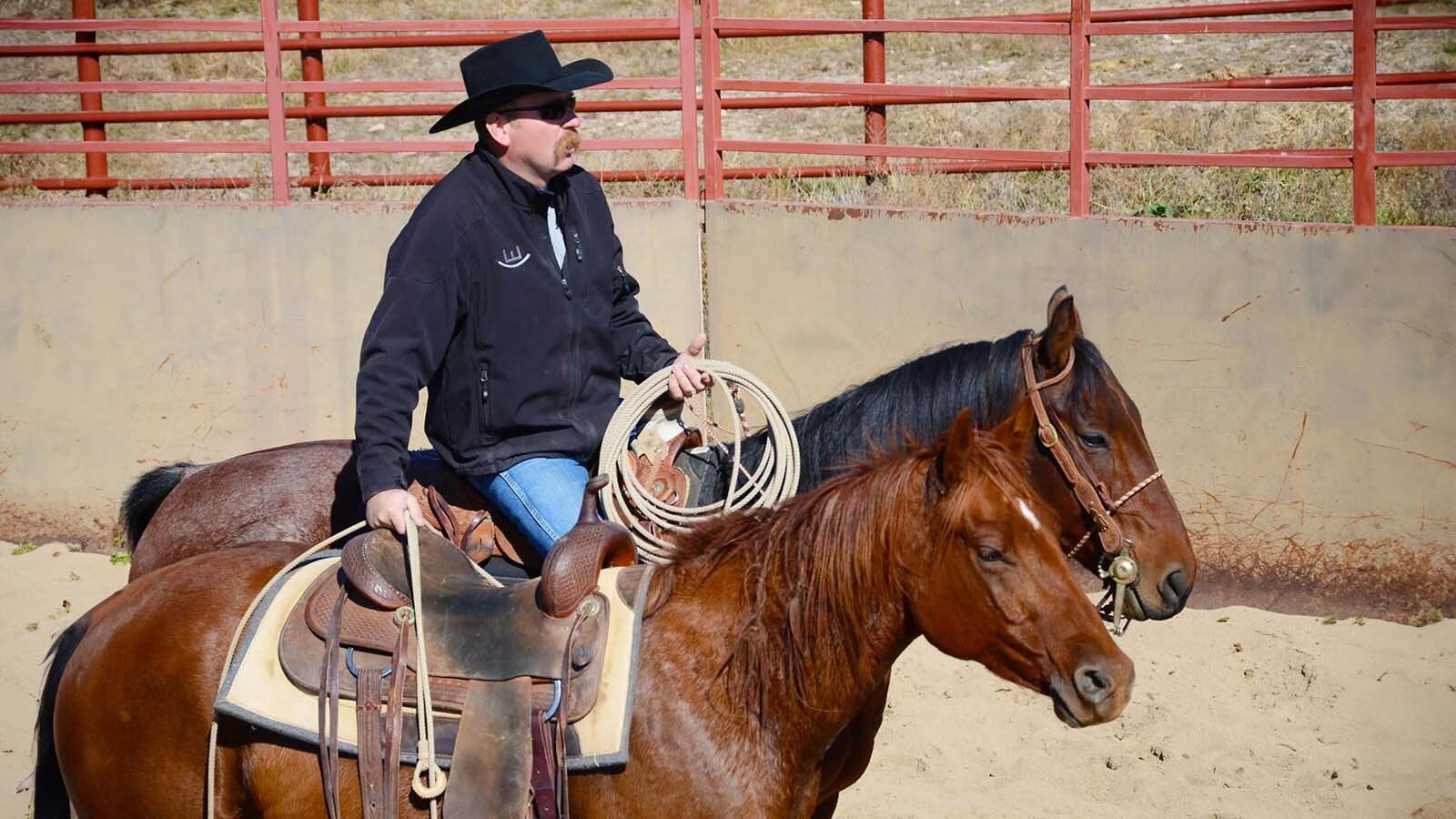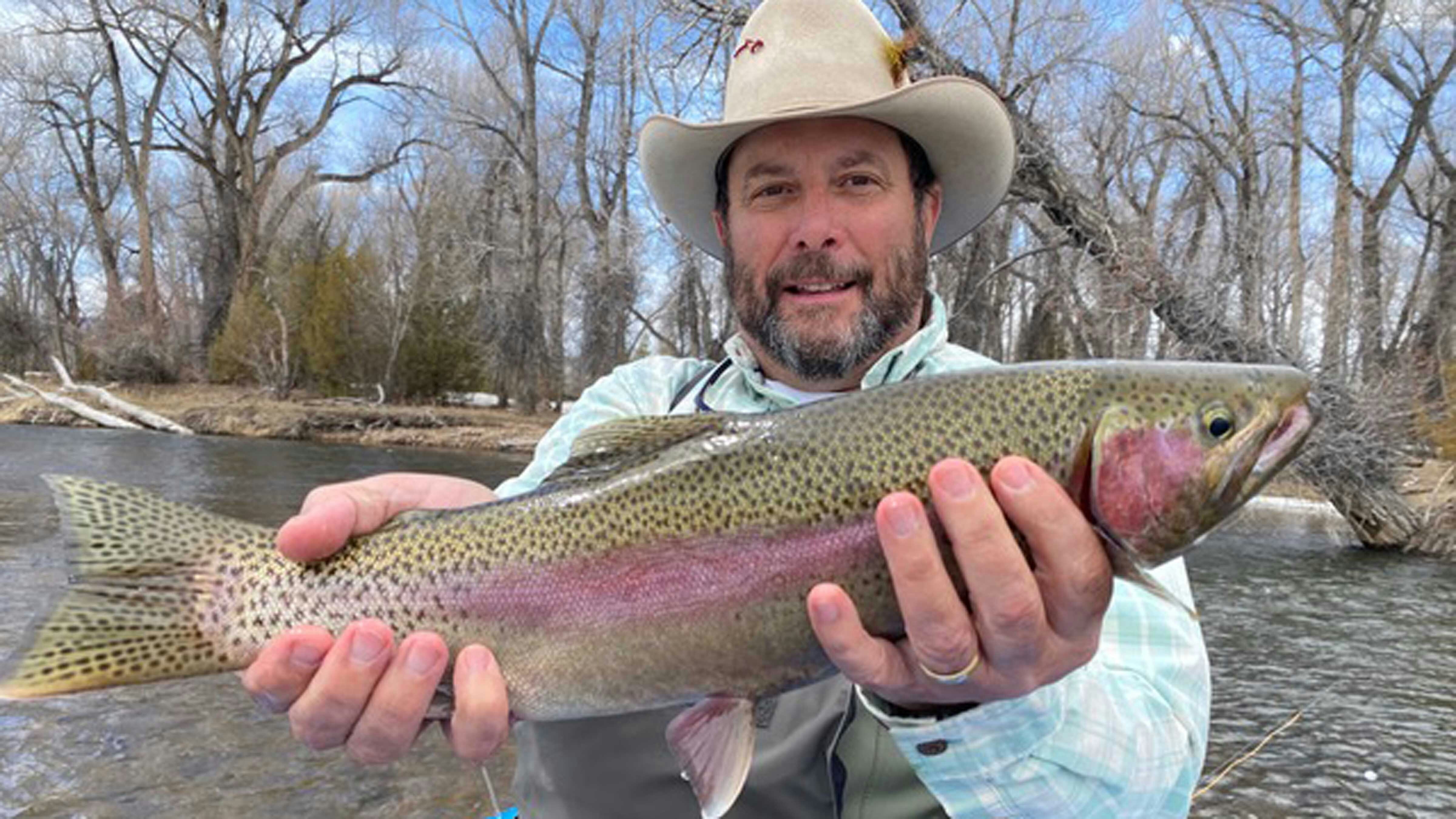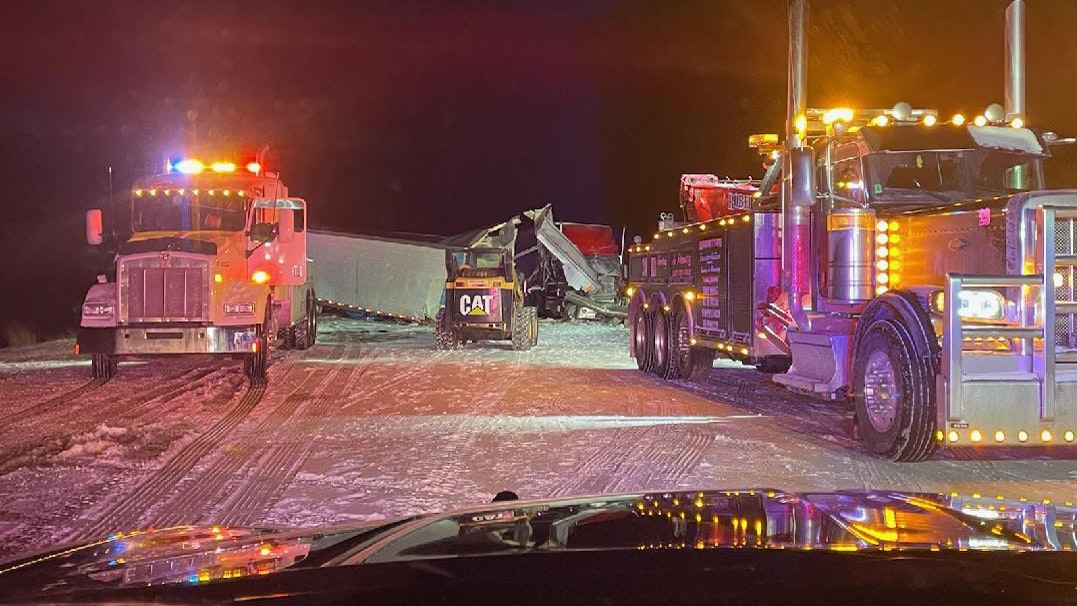Thirty-five miles from the nearest road in the Wyoming wilderness, Jeremy Morris learned an important lesson about miniature Hershey bars while working as a brand-new wrangler for a Wyoming dude ranch during what was to be a 12-day pack trip.
“The cook would make our lunches, and we always had a handful of those little candy bars in it,” Morris told Cowboy State Daily. “And I had my vest hanging outside of my tent with a couple of those little candy bars in it.”
They were so small, Morris forgot all about them by bedtime. Until, that is, at 2 a.m., when he heard some disturbing sounds in the middle of the night right next to his tent.
He woke with a start and saw something big and shadowy walking around his little tent. He was pretty sure it was a grizzly bear, so he stayed right where he was and tried to be as still as possible.
The next morning, Morris saw the evidence scattered all over the ground around his tent — grizzly bear tracks in the mud and stuffing pulled out of the vest he’d left two little candy bars in. The bear had completely destroyed the vest for them.
Luckily, no one was hurt, and most of the damage was confined to his ruined vest. Of course, his ego was going to take a beating over the next 11 days. His fellow wranglers weren’t going to let him forget how he’d almost become a cautionary tale over two little morsels of chocolate.
Despite all that, Morris still counts his days as a wrangler as among the best in his life. He made lifelong friends and learned skills that set him up for success in life. And he has legendary stories to tell his grandchildren one day.
“Ultimately, I got a job working for the Rockefellers at the JY Ranch, which is the Rockefellers’ private retreat in Grand Teton National Park,” he said. “And there were only two of us and only 20 horses, so it was a much smaller, intimate kind of setting.”
That job included high-level security and background checks, because, from time to time, the ranch hosted high caliber politicians, including an American vice president.
“And because I worked for the Rockefellers, I got approached by a headhunter from a staffing agency who did high-end ranches for wealthy and famous people,” Morris said. “So, I got jobs through that agency, and I don’t know that I would have had those opportunities if I hadn’t worked for the Rockefellers.”

Beer And Cute Girls
That’s not a bad outcome for a job that most people take when they’re young, college-age kids, looking to, as Kevin Meyer puts it, “drink beer, chase girls, ride horses, and work eight-hour days.”
Meyer is a horse trainer in Douglas these days but got his start as a wrangler. It’s a job he credits with teaching him everything he needed to know for success in life.
“I learned communication skills, not just with the guests, but with my co-workers,” Meyer said. “And then when I became a manager, I learned management skills and communication skills for that. I learned service skills of not just communicating but figuring out what I need to do to help someone have the best experience possible.”
Meyer was roped into the job by a friend who had worked at Jackson Lake Lodge in Wyoming.
“He had all these wonderful stories of lots of drinking beer, chasing girls, and riding horses and working eight-hour days, and I thought that sounded pretty darn good,” Meyer said. “So, I knew a couple of guys who worked up there and they helped me get a job.”
Meyer figured it was going to be a piece of cake for him. Sure, horses can be tricky and ornery creatures. But he grew up on a ranch and already knew how to handle them pretty well.
What he quickly learned is that wranglers can be just as ornery as the horses they ride, and that was going to keep him on his toes, because pranks were the order of just about every day.
In fact, even the ranch owner was in on the act. He was actually the one who suggested some of the harmless pranks, to help Meyer get even, like putting his fellow wranglers’ saddles on backwards.
“I know a backwards saddle sounds like a small thing, but when you’re kind of in a routine and you just ate and maybe you’re thinking about catching a quick cat nap,” Meyer said. “Then, when you come out to your horse, it doesn’t really register in your mind that the saddle is backwards. And I’ve seen people actually go to step up on their horse before they realize the saddle is backwards.”
Guests, meanwhile, wouldn’t typically notice that one stirrup was shortened until about 20 minutes into a ride. So that was another harmless prank to play on his fellow wranglers.
“It was all in good fun,” Meyer said. “You had to kind of provide your own entertainment, because (wrangling) is a very repetitive job.”
None of the pranks got too crazy and none were things that guests would particularly notice.
“You know, flipping a saddle around, that’s delaying the ride three minutes because it doesn’t take a wrangler very long to flip their saddle back,” Meyer said.
And a shortened stirrup is just an excuse for everyone except the afflicted wrangler to sit still for a spell and soak in the beautiful scenery.

No Bad Souls
That covered the pranks that were pulled while guests were around. But there was a whole different set of rules for the pranks pulled when it was just wranglers having a fun day off together. There were “payback” parties, and there were some wild horse rides.
Ellie Alley, who was a wrangler at several ranches in Wyoming including the Heart 6, very quickly learned to duct tape all of her equipment to her horse any time she was going out for the day with other wranglers for a ride.
“It was always about who had the fastest horse, because if you didn’t, you were going to get a mouthful of rocks,” she said. “And those guys would come by and jerk your cinch rope or take your bridle off. I’m talking at a full-on gallop.”
Because of those kinds of hijinks, a problem horse became one of Alley’s favorites. The horse was a half Arab cross named Abe. Honest Abe to be exact.
“That son of a gun bucked off everybody else in the corral,” Alley said.
Since Alley was the only one who could ride Abe without getting bucked off, he ended up being her horse.
But he was actually awesome.
“Abe was like the wind. Nobody could catch me,” she said. “He could turn around trees, get away from people, and he was so much fun. He could stop on a dime from a full run, and he could be 3 feet away in the blink of an eye, so you had to be able to stick with him. But once he figured out I wasn’t coming off, we got a lot more confident.”
Payback parties, meanwhile, were “bring your own” beer fests. But the beer you brought was related to the mistakes you had made on the trail in the time since the last payback party.
“Like if your hat came off, you owed a six pack,” Alley said. “If you got bucked off, that might be a case (of beer) or a bottle of whiskey. There were certain payments for stuff that happened.”
Once or twice a year, there’d be a big party, and everyone would bring their paybacks to it.

The Ornery Guest
Being a woman wrangler wasn’t necessarily a disadvantage, Alley added.
“As long as you would show up and work, it didn’t matter who you were,” she said. “These guys were gentlemen. And we had some phenomenal horsemen, so if you could ride, they would respect you. And even if you couldn’t ride, if you did your dues — if you tried — they would help you.”
There was camaraderie not just among individual ranches, but from ranch to ranch, as well, camaraderie that is a big part of her continued love for Wyoming. Alley now lives in Arizona, but she dreams of one day returning to Wyoming. That’s because all fun and games aside, everyone was always looking out for everyone else.
“We didn’t have any bad souls,” Alley said. “If there were any, they wouldn’t last long.”
In fact, the only “bad souls” the wranglers ever had to deal with usually weren’t ornery horses or ornery wranglers.
It was ornery guests, who had paid a lot for an experience and felt entitled to the experience they wanted — right down to how their horse behaved.
“They want things a certain way, and they’re paying a lot of money to stay there,” Meyer said. “So, they’re well within their rights to expect a certain standard.”
But, at the end of the day, a horse isn’t impressed by anyone’s bank account, no matter how big it is, and there’s not much any wrangler can do about that.
“Like, I’m sorry if you don’t like your horse,” Meyer said. “I did my best to match you to your horse, and I don’t know if I have another one that’s going to be any better. We can try a different horse.”
Tempers among the wranglers could also get a bit hot with the increasingly hot weather as the season wore on. That didn’t make it easier to handle a demanding guest trying to dictate things no one could control.
“You just had to figure out how to tell people, you just have to push through a couple more weeks,” Meyer said. “I know it’s hot and dry. We just have to get to the next couple weeks, and we’ll be good.”
Runaway Horses
Even a good horse will sometimes spook and run away. That means every wrangler, at some point in their career, is going to find themselves with the not so enviable job of chasing one down quickly, Jackson resident and former Lost Creek wrangler Jake Nichols told Cowboy State Daily.
“That’s how it is with horses,” he said. “Horses are flight animals and whatever freaks it out, whether it was a sage grouse all of a sudden popping out of the bush, or whatever scares that horse.”
When that happens with a guest on board, it’s a pell-mell chase after the dude, with fingers, toes and eyes all crossed at once.
“You’re just hoping the dude stays on,” Nichols said. “And you’ve got to go run that horse down and then reach out and grab that horse’s halter and just whoa them down.”
Unlike many wranglers who came West while they were young college kids, Nichols didn’t turn up in Wyoming as a wrangler until he was in his 30s.
“Everyone’s motivation is personal to them,” he said. “For me, it was going from the most populated place in the country to the least. That’s how I picked Wyoming. And I mean everybody wants to be a cowboy, right? I just got to it late. Like you ask any kid, when they’re 8, it’s fireman, policeman and cowboy.”
Being a wrangler was a dream come true for Nichols, even if, looking back, it did turn out to be a young person’s game.
“It’s a fun thing to do when you’re young,” he said. “(But) I would have gotten better health insurance. You just have to enjoy it while you can do it because it won’t be forever.”
Nichols has made a career since then as a radio personality for Cowboy State Daily, as well as a DJ for weddings and other events.

Learning To Ride Backwards
As a wrangler, Nichols quickly found himself riding more or less backwards on a horse, twisted around so he could keep one eye on his dudes at all times.
“It’s an art, and you learn it fast,” he said. “I can’t tell you how many times I heard a blood-curdling scream from a little kid behind me and turned around expecting to find somebody dead or falling on the ground.”
What the blood-curdling scream usually turned out to be was just a kid’s reaction to seeing a horse pooping for the first time.
Youths who were in real trouble, on the other hand, were deceptively quiet.
“I had one ride where the kid goes, ‘Mister, mister —' and I was kind of ignoring him, but then I turned around to find that he had gone under a tree branch and he was scared he wouldn’t fit, so he grabbed the branch and the horse walked right out from under him,” Nichols said.
Nichols’ eyes popped out of his head, but the branch was good and solid, so a quick solution came to mind.
“I told him, ‘Stay there, we’ll bring the horse back around,’” Nichols recalled.
Wrangling taught Nichols how to anticipate wrecks before they became wrecks. That started with sizing up people to match them to the best horse.
It also meant having a good memory for the quirks of each and every horse. Some liked women, some liked men, some liked children.
But some of the horses had even more peculiar quirks than that. Meyer once ran into a horse named Godzilla who disliked Asians, for no discernible reason whatsoever.
“Your job is half babysitter,” Nichols said. “So, you cannot have runaways. You cannot have bucking horses. You cannot have dudes coming off their horses. It’s bad for business.
“You have to be able to stop the wreck when it’s happening. But the really great wranglers see the wreck coming and it never happens at all,” Nichols continued. “The dudes never even know things might have been about to get Western a second ago, because they never did. And that’s what the lifelong wrangler wants to put on the top of their tombstone. He saw the wreck coming.”

Stories That Last A Lifetime
Tips were key to making the wrangler life lucrative and the key to that was looking the part and telling a few, well-timed, funny Cowboy stories.
Those stories could be a bit windy. That didn’t hurt at all. They could even be fake intrigues about surrounding ranches.
For example, one time Nichols told his group they were on a scouting mission because some horses had gone missing and he thought they might be on a neighboring ranch. Other times, Nichols and his fellow wranglers arranged miniature fake cattle drives, just like in the movie, “City Slickers,” to entertain their guests.
It didn’t matter, as long as it was good, clean fun — the kind where no one gets hurt, and everyone has a story to tell.
Every ranch had its own dress codes, Nichols learned. At some you could wear sunglasses, at others, those weren’t old-school enough.
It was all about creating the right look for the ranch.
“The whole look was often cherished,” Nichols said. “You’d have chaps, chinks, spurs, a couple of pairs of boots, and some ranches would really emphasize and preferred that you look punchy, as they say. So, you would have the scarf and the whole bit.”
Looking the part, talking the talk, walking the walk did create a lot of goodwill for mistakes. Which every beginning wrangler needs.
“I was good at horse riding and horse training type of aspects,” Nichols said. “But one of the big eye openers was how different the West was. Like I took a job in Colorado first, then Montana, then Wyoming, and the Mountain West is just so big that when we went on trail rides, I would often get our group lost.”
That meant a lot of walkie-talkie calls back to base, advising the ranch that they were all going to be a little bit late for dinner.
“They’d say, ‘Well, where are you?’ And I’d say, ‘Well, if I knew, we wouldn’t be late for dinner!’”
At the same time, keeping it fun for the guests was paramount, no matter what was happening.
As long as the guests were happy, everything was sure to come out all right in the end, because everyone was going to get a legendary Wyoming story to tell — the kind that lasts a lifetime and gets better with every telling.
Contact Renee Jean at renee@cowboystatedaily.com

Renée Jean can be reached at renee@cowboystatedaily.com.





